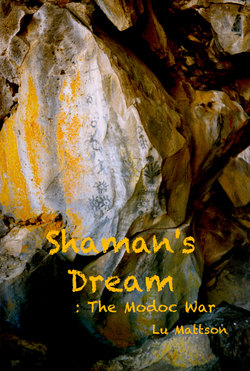Читать книгу Shaman's Dream: The Modoc War - Lu Boone's Mattson - Страница 70
На сайте Литреса книга снята с продажи.
Chapter 7: The Death of Compotwas Doctor #66
ОглавлениеAfter the shaman had fled, it was the girl’s aunt who came to cleanse her body. When her mother had gone outside, weeping loudly, never again to say her name, her aunt came with the cloths and water. Silently, the woman washed the girl’s scratched face and closed her eyes. She washed each torn arm and leg, her torso, her bruised feet. Where the girl’s legs met her body, her aunt washed the darkness, a bruising. She unclenched the girls fists. She combed and braided her hair. She put the new dress on her, the one meant for the celebration that would end her womanhood rites, but now useless for that. When her aunt had finished and had folded the girl’s arms across her breast, she brought the white buckskin and wrapped her in it. And then the men came in.
They lifted her onto the tanned buckskin carrying blanket and, one at each corner, hefted her up the ladder as her mother wailed; her mother, with her hair already cut short, her face blackened, her head smeared with pitch. They lifted the girl’s body head-first out the door, her head toward the west. They carried her toward the rocky promontory, the rest of the village following. Parents tried to send children away, but the children, grown stubborn and silent, unwilling to be sent off by themselves, persisted. They hung onto their parents’ hands or legs, watching.
Some of the women had already gone ahead to the place the men were taking her. They had set aside the raised platform’s small stones, smoothed the ashes from earlier pyres, laid down the logs and sagebrush, piled up more to be used later. Her uncle, Keintpoos, stood with the fire-drill, ready to light the new fire.
Her wrapped body stretched out, head toward the lowering sun, she could have been anyone. The fire-tenders stood with their long poles, urging the flames to burn higher. Then they too sat down, joined the others, talked quietly as Fire, Lóluk, did his work. The children were hushed. The men paused now and again to fill and smoke their pipes, blowing softly. It was only a small pile of her things that sat waiting for the flames to burn high enough. Nothing good enough for anyone to claim. Occasionally someone broke a string of beads and tossed a few on the fire. They listened as her mother cried out that the girl should not be dead, not a child any longer, not a woman yet. They shushed her mother as they did the children, telling her not to cry so.
Her uncle accepted the black buckskin bands for his wrists, just as her mother did, to remember in the days to come not to give in to laughter, to remind others that he must mourn her.
All the rest of the day and into the night they sat together, the fire-tenders rising occasionally to stir up the sparks or shove the logs closer to the dwindling bundle. And when it was finished, after the women had replaced the small stones on the still-warm ashes, they went home; her mother to wail each morning and night, heard by the whole village. Her uncle, after his ritual mourning, to follow northward with his men in the direction the shaman had taken, along the trail back up to the Klamath reservation.
